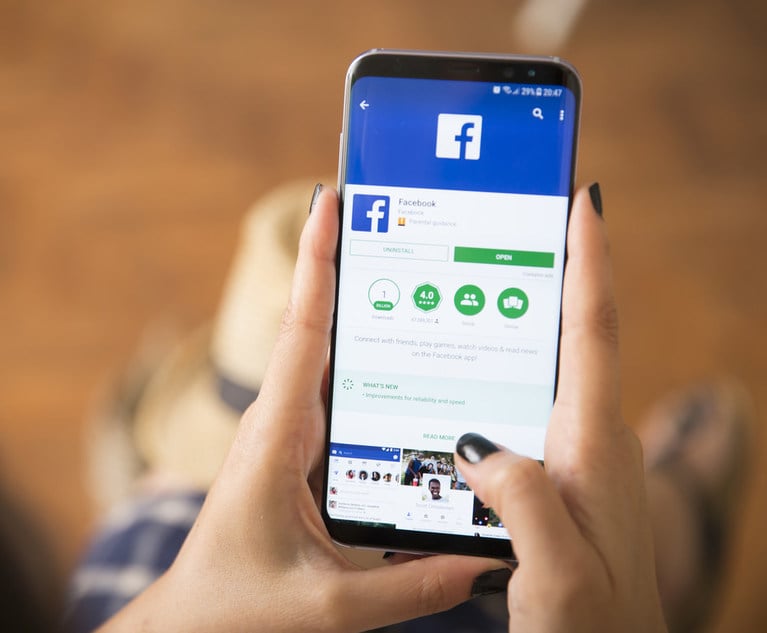 Credit: Nadir Keklik/Shutterstock.com
Credit: Nadir Keklik/Shutterstock.comJudge Rejects Meta’s Plea to Send FTC Antitrust Suit to Trash Heap
Though Judge James Boasberg sided with the FTC, he said the "commission faces hard questions about whether its claims can hold up in the crucible of trial. Indeed, its positions at times strain this country’s creaking antitrust precedents to their limits.”
November 14, 2024 at 01:22 PM
4 minute read
A federal judge on Wednesday ruled that the Federal Trade Commission’s 2020 lawsuit against Meta will advance to trial, rejecting the social media giant’s arguments that the passage of time has made what was from the outset a weak case even flimsier.
In a snappily written 92-page opinion, James Boasberg, chief judge for the District of Columbia, rejected Meta’s motion for summary judgment, finding that the FTC had presented evidence sufficient for a reasonable fact finder to conclude that Meta, parent of Facebook, had illegally monopolized the market for “personal social networking services.”
That finding is a setback for Menlo Park, California-based Meta’s all-star legal team, which includes the litigation boutique Kellogg, Hansen, Todd, Figel & Frederick as well as Wilmer Cutler Pickering Hale and Dorr; Cravath, Swaine & Moore; and Davis Polk & Wardwell.
Yet Boasberg’s opinion also gave Meta's attorneys plenty of grist for optimism that they will prevail at trial. For example, the judge said the FTC's victory “does not obscure the fact that the commission faces hard questions about whether its claims can hold up in the crucible of trial. Indeed, its positions at times strain this country’s creaking antitrust precedents to their limits.”
The crux of the agency’s case is that Meta monopolized the social media market by purchasing Instagram for $1 billion in 2012 and WhatsApp for $19 billion in 2014 and then used anticompetitive practices to thwart competition.
If the FTC prevails at trial, one of the potential remedies would be to force Meta to divest Instagram and WhatsApp. But in his opinion, Boasberg cast proceedings up to this point as more of a draw than as a prelude to the FTC's prevailing at trial.
“While the parties’ legal jousting is both impressive and comprehensive, it leaves no clear victor,” he wrote.
For the FTC, he wrote, even demonstrating the existence of a monopoly “is no easy sail, and the FTC has chosen to navigate into gusty winds,” a reference to “the complexities of a platform market that offers its products to end users at no cost while charging for advertising.”
On top of that, he wrote, “time and technological change pose serious challenges to the market analysis here.”
In a statement to the Washington Post, Meta spokesman Chris Sgro said, “We are confident that the evidence at trial will show that the acquisitions of Instagram and WhatsApp have been good for competition and consumers.”
FTC spokesperson Douglas Farrar told the Post that the case “represents a bipartisan effort to curtail Meta’s monopoly power and restore competition to ensure freedom and innovation in the social media ecosystem.”
Boasberg opened his opinion by noting that the 2010 movie about Mark Zuckerberg’s creation of Facebook was called “The Social Network,” a title that by itself demonstrates how dramatically the social media landscape has shifted in the intervening years.
The company “argues that the market with which it was once nearly synonymous does not even exist,” Boasberg wrote. “Gazing across an online landscape teeming with companies catering to every conceivable interest, Meta sees a bloody battle for users’ time and attention in which its products face withering competition.”
The FTC filed its suit in late 2020, in the waning days of President Donald Trump's first administration, but Boasberg the following year dismissed it, citing insufficient evidence. “It is almost as if the agency expects the Court to simply nod to the conventional wisdom that Facebook is a monopolist,” he wrote.
But he gave the FTC, which had just come under the leadership of Chair Lina Khan, an opportunity to refashion its complaint. The agency did so, and in 2022 Boasberg denied Meta’s motion to dismiss, writing that the FTC had provided “more robust and detailed” evidence to support its monopoly claims.
Boasberg noted in Wednesday’s opinion that the evidentiary record in the case now runs thousands of pages, much of it packed with thick analysis of antitrust law. But the judge, nominated for the court by President Barack Obama in 2011, seemed to savor the challenge of plowing through the intricacies in an entertaining way.
And he seemed to appreciate when counsel for the parties had done the same. For example, in his opinion he noted that the FTC had cast Meta as being in a frenzy to buy WhatsApp, fearful that a rival would strike a deal first and refashion the messaging app into a competitor to Facebook.
“Defendant amusingly contends that the FTC’s narrative ‘makes Jack-and-the-Beanstalk sound like a documentary,’” the judge wrote.
NOT FOR REPRINT
© 2025 ALM Global, LLC, All Rights Reserved. Request academic re-use from www.copyright.com. All other uses, submit a request to [email protected]. For more information visit Asset & Logo Licensing.
You Might Like
View All

Internal GC Hires Rebounded in '24, but Companies Still Drawn to Outside Candidates
4 minute read
Advance Auto Parts Hires GC Who Climbed From Bottom to Top of Lowe's Legal Department
2 minute read
State AG Hammers Homebuilder That Put $2,000-Per-Day Non-Disparagement Penalty in Buyer Contracts
3 minute readTrending Stories
- 1With DEI Top of Mind, Black Judges Discuss Growing Up During Segregation, Efforts to Diversify the Profession
- 2Big Law's Middle East Bet: Will It Pay Off?
- 3'Translate Across Disciplines': Paul Hastings’ New Tech Transactions Leader
- 4Milbank’s Revenue and Profits Surge Following Demand Increases Across the Board
- 5Fourth Quarter Growth in Demand and Worked Rates Coincided with Countercyclical Dip, New Report Indicates
Who Got The Work
J. Brugh Lower of Gibbons has entered an appearance for industrial equipment supplier Devco Corporation in a pending trademark infringement lawsuit. The suit, accusing the defendant of selling knock-off Graco products, was filed Dec. 18 in New Jersey District Court by Rivkin Radler on behalf of Graco Inc. and Graco Minnesota. The case, assigned to U.S. District Judge Zahid N. Quraishi, is 3:24-cv-11294, Graco Inc. et al v. Devco Corporation.
Who Got The Work
Rebecca Maller-Stein and Kent A. Yalowitz of Arnold & Porter Kaye Scholer have entered their appearances for Hanaco Venture Capital and its executives, Lior Prosor and David Frankel, in a pending securities lawsuit. The action, filed on Dec. 24 in New York Southern District Court by Zell, Aron & Co. on behalf of Goldeneye Advisors, accuses the defendants of negligently and fraudulently managing the plaintiff's $1 million investment. The case, assigned to U.S. District Judge Vernon S. Broderick, is 1:24-cv-09918, Goldeneye Advisors, LLC v. Hanaco Venture Capital, Ltd. et al.
Who Got The Work
Attorneys from A&O Shearman has stepped in as defense counsel for Toronto-Dominion Bank and other defendants in a pending securities class action. The suit, filed Dec. 11 in New York Southern District Court by Bleichmar Fonti & Auld, accuses the defendants of concealing the bank's 'pervasive' deficiencies in regards to its compliance with the Bank Secrecy Act and the quality of its anti-money laundering controls. The case, assigned to U.S. District Judge Arun Subramanian, is 1:24-cv-09445, Gonzalez v. The Toronto-Dominion Bank et al.
Who Got The Work
Crown Castle International, a Pennsylvania company providing shared communications infrastructure, has turned to Luke D. Wolf of Gordon Rees Scully Mansukhani to fend off a pending breach-of-contract lawsuit. The court action, filed Nov. 25 in Michigan Eastern District Court by Hooper Hathaway PC on behalf of The Town Residences LLC, accuses Crown Castle of failing to transfer approximately $30,000 in utility payments from T-Mobile in breach of a roof-top lease and assignment agreement. The case, assigned to U.S. District Judge Susan K. Declercq, is 2:24-cv-13131, The Town Residences LLC v. T-Mobile US, Inc. et al.
Who Got The Work
Wilfred P. Coronato and Daniel M. Schwartz of McCarter & English have stepped in as defense counsel to Electrolux Home Products Inc. in a pending product liability lawsuit. The court action, filed Nov. 26 in New York Eastern District Court by Poulos Lopiccolo PC and Nagel Rice LLP on behalf of David Stern, alleges that the defendant's refrigerators’ drawers and shelving repeatedly break and fall apart within months after purchase. The case, assigned to U.S. District Judge Joan M. Azrack, is 2:24-cv-08204, Stern v. Electrolux Home Products, Inc.
Featured Firms
Law Offices of Gary Martin Hays & Associates, P.C.
(470) 294-1674
Law Offices of Mark E. Salomone
(857) 444-6468
Smith & Hassler
(713) 739-1250






